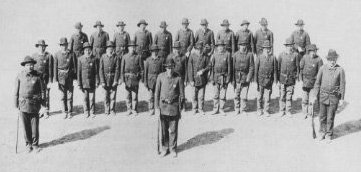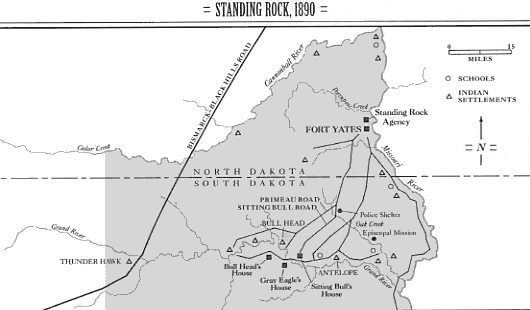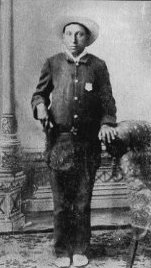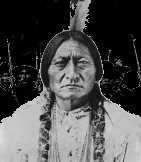


of Standing Rock Agency |
It was 10:15 P.M. December 14, 1890 and Major James McLaughlin closed his tired eyes. He sat at his desk in the warm parlor of his house with a white picket fence at Standing Rock Agency. James was tired, weary to his bones. But he was too anxious to be sleepy. His wife Louise was in another room preparing for bed. Looking outside, McLaughlin saw it was a very dark night -- no winds and a cold mist in the air, no moon, no stars. Favorable conditions for carrying out their plan. The time was approaching for the arrest and capture of Sitting Bull -- a few hours away, before daybreak. Forty miles away, the agency Indian police force, lead by Lieutenant Bull Head and backed by First Sergeant Shave Head were probably gathering now in the still night along the Grand River. McLaughlin and Colonel Drum of Fort Yates had worked out a good plan for the capture -- it was the only plan that would minimize any adverse reaction from Sitting Bull's "hostiles" and Ghost Dancers. McLaughlin did not want to send the army into the camp which would ignite a widespread conflict, with a potential for violence and a stampede of the people away from their homes. McLaughlin felt confident in the plan and had confidence in Bull Head and the police force to bring Sitting Bull in. Over the last month, McLaughlin had been strengthening the force. Tonight the police force, known as the ceska maza or "metal breasts", would be supplemented by twenty special policemen, whom Washington authorized to be sworn in for three months' service. As a backup, Colonel Drum will have a squadron of soldiers a short distance away, close to the river bluffs.
"Are you coming to bed, dear?" Louise asked James as she gathered a couple Indian blankets from the parlor. One of the blankets had been made by Louise's grandmother, Ha-za-ho-ta-win, a full-blooded Sioux of the Medawakanton Band of Indians in Minnesota. James and Louise had met and married twenty-six years ago in Mendota, Minnesota. They have five children, all but the youngest are away at eastern schools; James Henry, 22, Marie Imelda, 20, Charles Cyprian, 19, John Graham, 18, and Rupert Sibley, 15. They were also raising a young daughter of one of Sitting Bull's chief's named Annie Owns the Fire. Annie's father had died recently and her mother was drinking herself swiftly into oblivion. Annie was a year old and sound asleep in the couple's bedroom.
"I'll be there presently. Good night," James said as Louise placed her arm on her husband's shoulder. James turned towards Louise as she bent to kiss his cheek.
"Not to worry, James." Louise ran her fingers through his thick hair and then patted the back of his neck. "You are doing the best thing for all. After tonight you will see better days around here."
James stood and hugged the 'Love of his life.' "Yes Lou," he said, "the Dance will be quickly forgotten, and our Rupert will be seeing his classmates in school again."
"So come to bed soon," Louise whispered as she went off.
As the minutes past, and as James sat wondering about what was happening along Grand River, the clock on the mantle clicked slowly and loudly.
The stealthy undertaking in the dead of the night.
In his cramped cabin along the Grand River, five miles from Sitting Bull's cluster of cabins and the many tipis of the Ghost Dancers, Bull Head was gathering the men. Twenty-eight men so far. The regulars wore their blue uniforms and badges. The specials had tied white handkerchiefs around their necks as identification. A somber mood lay on the group. Some, including Bull Head, had fought with Sitting Bull at the Little Bighorn. Some had starved with him in exile in Canada. But, that was then, this is now.
Bull Head outlined McLaughlin's plan. The police would ride down the river on the south bank, then cross to enter the Sitting Bull settlement from the south. The residents would not be looking for trouble from that direction, for Fort Yates and the agency lay to the north. The privates would surround Sitting Bull's cabin while the officers went inside to make the arrest.

|
From the school seven miles down river, the school master Carignan, Lone Man, and three special policeman, hurried through the dark to Bull Head's place. Long after midnight they crept cautiously along the edge of the Sitting Bull settlement, setting off a noisy chorus of dogs but seeing no sign of the residents. The little cavalcade reached Bull Head's as the force began to saddle for departure.
Bull Head decided the trail on the south side of the river was too rough to take the wagon which was to be used to escort Sitting Bull back to Fort Yates. They would obtain a wagon in the Sitting Bull settlement, but use it for carrying Sitting Bull's wives and children. Bull head assigned Red Bear and White Bird to hurry to Sitting Bull's corral, where he stabled the gray circus horse presented to him by Buffalo Bill, and saddle it in readiness for a quick getaway.
At 4:00 A.M., with an icy drizzle filling the air, the police gathered in front of Bull Head's cabin. Bull Head led them in a Christian prayer. After mounting, they formed a column of twos and trotted into the cold black night.
Two miles downstream stood Gray Eagle's cabin. The column paused there at 4:30, as Sergeant Eagle Man's detachment from Oak Creek finally caught up. The force now number one officer, four sergeants, fourteen privates of the regular force, and twenty special policemen.
At Gray Eagle's he and four more joined as volunteers. They made forty-four. The men guided their horses through the wet bottoms of Grand River and, hooves clacking and slipping on the ice, crossed to the north bank. Owls hooted and coyotes howled. "Even they gave warning," growled someone, "so beware."
Sitting Bull slept on his pallet with the elder of his two wives and one of his small children. Also in the room were two old men, guests invited after the night's dance ended; Crow Foot, the serious-minded favorite son, now fourteen; and the wife of One Bull who was working off the reservation. The rest of Sitting Bull's family occupied the other, smaller cabin to the north, across the wagon road.

or Metal Breasts. |
Shortly before 6:00 A.M., the clatter of galloping hooves and the barking of dogs broke the predawn stillness. The sleeping people stirred as someone pounded and kicked on the door and shouted Sitting Bull's name. The door burst open and the room filled suddenly with dark forms. A match flared and went out. Another match caught a candle wick and cast a flickering light across the room. Shadows moved towards Sitting Bull.
"Brother, we came after you," barked Sergeant Shave Head as he seized Sitting Bull.
"How, all right," was the reply.
As more police crowded into the room, the two old men slipped out, as did One Bull's wife, who ran to the chicken coop and watched. Remaining inside were Crow Foot and Sitting Bull's wife, with the child clinging to her back. She began to wail and flailed her arms wildly.
Nervous over confronting the mighty Sitting Bull, some of the police manhandled the prisoner and shoved one another. Several of the officers wrestled Sitting Bull, naked, toward the door.
"This is a great way to do things," he exclaimed, "not to give me a chance to put on my clothes in winter time."
His wife went to the other cabin and retrieved the clothes he wanted to wear. The policemen hurried him through the process of dressing, then thrust him again toward the door. He braced his hands and feet against the door frame.

Commander of the Indian Police |
"Let me go," he cried, "I'll go without any assistance."
They emerged from the door and paused. Bull Head and Shave Head flanked Sitting Bull holding each of his arms. Sergeant Red Tomahawk stood in the rear, pistol in hand.
The gray circus horse was there, saddled and ready, but barking dogs, the shrieks of Sitting Bull's wife, and the general commotion had alerted the entire settlement. In the faint light of daybreak, people converged from all directions, pressing against the cordon of nervous police and shouting taunts and insults.
Catch-the-Bear shouldered his way through the crowd. "Now, here are the ceska maza," he spat out scornfully, so all could hear. "You think you are going to take him. You shall not do it."
Turning to the crowd behind him, he yelled, "Come on now, let us protect our chief."
As men began to press closely against the police line, Sitting Bull's son Crow Foot came to the doorway.
"Well," he chided his father, "you always called yourself a brave chief. Now you are allowing yourself to be taken by the ceska maza."
For several moments Sitting Bull lost himself in thought. "Then I shall not go," he declared.

|
"Come now," implored Bull Head, "do not listen to anyone."
Bull Head turned to Jumping Bull, who had come unarmed on the scene and asked his aid.
"Brother," said Jumping Bull, "you ought to go with the police and not cause any trouble."
"Uncle," Lone Man added, "nobody is going to hurt you. The agent wants to see you and then you are to come back -- so please do not let others lead you into any trouble."
Sitting Bull hung back. Bull Head and Shave Head tightening their grip and pulled. Red Tomahawk pushed from behind. They moved toward the waiting horse.
The crowd went wild. People shook their fists, cursed the police, and shouted, "You shall not take our chief."
Suddenly Catch-the-Bear shouldered his Winchester, took aim, and squeezed the trigger. The bullet tore into Bull Head's right side and sent him sprawling. As Bull Head fell, he turned his revolver up and shot Sitting Bull full in the chest. Pushed from behind, Red Tomahawk fired another bullet into the back of Sitting Bull's head. An instant later Strikes-the-Kettle fired, the bullet punching into Shave Head's stomach. All three fell together in one heap.
As the three men crumpled to the ground, Lone Man sprang at the smoking muzzle of the weapon that had gunned down his relative and superior, Bull Head. Catch-the-Bear swung it at Lone Man and pulled the trigger, but it misfired. Lone Man tore the rifle from his grasp, clubbed him with the butt, and shot him dead. Infuriated, Sitting Bull's men swarmed over the metal breasts with knives, clubs, and guns. It was a vicious battle at close quarters. Bullets laced the little battleground, fired at pointblank range.
Police fire killed five more of Sitting Bull's followers, three more dropped with wounds that did not prove fatal.
Three more bullets plowed into the wounded Bull Head. Four more policemen took fatal rounds, and Private Middle sustained a painful wound that later would cost him his foot.
In only a few minutes, the bloody fight ended as abruptly as it had begun. The dancers broke away and raced to a grove of trees along the river behind Sitting Bull's cabin.
Red Tomahawk took command and ordered the wounded Bull Head, Shave Head, and Middle dragged into the cabin and made as comfortable as possible on the bedding. The rest took defensive positions in the barn and corral.
Inside the cabin, one of the men spied a slight movement in a pile of blankets. Lone Man pulled them aside and uncovered Crow Foot.
"My uncles," the boy cried, "do not kill me. I do not wish to die."
The police asked Bull Head what to do with the youth. With four bullets in him, Bull Head looked up from his pallet.
"Do what you like with him," he answered bitterly. "He is one of them that has caused this trouble."
Lone Man smashed Crow Foot across the forehead with a rifle butt, which sent him reeling across the room and out the door. There Lone Man and two others, tears streaming down their cheeks, pumped bullets into him.
Red Tomahawk ordered a private to mount the circus horse and ride swiftly toward Oak Creek to alert the soldiers. As he galloped from the battleground, Sitting Bull's people opened fire from the timber. The private raced away unharmed, while the police took shelter and returned the fire. For more than an hour, the two sides exchanged fire.
Daylight, made hazy by a thin fog, had spread over the Grand River Valley by the time Captain Fechet's cavalry squadron galloped to the bluffs overlooking the battlefield. The army's artillery drove the dancers from the timber and they fled to a knoll overlooking the battlefield to the west.
Dismounting in front of Sitting Bull's cabin, Captain Fechet surveyed the grisly scene. "I saw evidence of a most desperate encounter," he later wrote. "In front of the house, and within a radius of 50 yards, were the bodies of 8 dead Indians, including that of Sitting Bull, and 2 dead horses. In the house were 4 dead policemen and 3 wounded, 2 mortally. To add to the horror of the scene the squaws of Sitting Bull, who were in a small house nearby, kept up a great wailing."
One of the most devout of the Ghost Dancers, Crow Woman, clad in his red bulletproof ghost shirt, mounted on a splendid black horse, and brandishing a long staff, burst from the timber eighty yards from the settlement and charged up the valley.
As he galloped, he sang: "Father, I thought you said / We were all going to live."
Police opened fire with their Winchesters, and Crow Woman reined into the timber. Once more he charged into the open, and once more police bullets turned him back to the timber. A third time he dashed into the valley, this time passing between two calvarymen sent out as sentries. Both fired at close range, but missed. Crow Woman rode triumphantly up the valley and out of sight, a living demonstration of the protective powers of the ghost shirt.
The mission of the police and soldiers had been to bring in Sitting Bull, nothing more. Captain Fechet had some of the woman move up and down the valley spreading word that he was returning to the fort and would not give chase. Sergeant Red Tomahawk, intent on carrying out Bull Head's instructions to the letter, meant to deliver Sitting Bull's corpse to McLaughlin. The wounded Bull Head, Shave Head, and Middle were hoisted tenderly into Fechet's ambulance, while the dead police and Sitting Bull were loaded into an old farm wagon from the settlement and hitched to Indian ponies.
Shortly after noon on December 15, 1890, the little cavalcade crawled up the trail to the plains and pointed north on the road to Standing Rock Agency. Cavalry and an infantry column brought up the rear.
Waiting for word of the outcome.
James McLaughlin spent a sleepless night while waiting anxiously for word of Sitting Bull's capture. At the break of dawn, he alternately paced and stood waiting by the window, staring towards Grand River many miles away. Awake now too, Louise sensed James had not slept and warmed some milk and honey for him on the stove. The morning grew lighter, but fog still was suspended above the Missouri and in scattered low areas on the agency. Their cozy house with the white picket fence sat isolated from the other buildings in the center of the frosty, barren agency grounds.
Another hour passed, and Louise stood with her arm around James by the window. James was lost in thought and silent. She heard the baby starting to stir in the bedroom.
In the southwest, James saw the rider. Coming fast up the road from Grand River. A solitary rider in a great hurry. Closer now, James saw the black horse was heading in their direction. With an Indian atop. Heading straight for the house.
Alarmed, his heart skipping a beat, James strode quickly to the gun cabinet and pulled out two rifles and some ammunition. He quickly loaded one gun, then the other. As he walked back to the door, he handed one of the rifles to Louise as she backed up, trembling with fear.
"What is it?" Louise asked as she tried to sort out what was suddenly happening. She held the rifle loosely and awkwardly -- she had never fired a gun before.
While watching the Indian approaching the picket fence at a gallop, James directed, "You may need to shoot to protect our home. Whatever happens, stay in the house."
James pushed her to the side of a window where they watched the Indian gallop wildly back and forth along the fence. The Indian, wearing a red ghost shirt, was brandishing a long staff that he was pumping up and down above his head.
Since the rider appeared to have no gun, James opened the door and stepped out into the cold dampness, his heart racing under the rifle across his chest. The Indian was shouting at him in Lakota, pumping his fist holding the reins and waving the staff wildly with his other arm.
James walked slowly out to the middle of the yard, rifle still across his chest, his finger poised on the trigger. The Indian galloped to the end of the fence, then turned once more while shouting. He drew up quickly, sending the horse's front legs waving high in the air and bellowed now in English. "You killed our chief," he wailed. "Your ceska maza were your bullets. The blood of Sitting Bull is on your hands."
"Hopo! Hopo!" The Indian jerked the reins and his horse turned quickly away from the house and within seconds was galloping out of the agency compound, heading in a fury towards the Missouri. The air was perfectly still, and soon James could no longer hear the sound of the horse. James stood benumbed in the complete silence.
Light-headed, James turned and walked unsteadily towards the house. A dark object on the white, frosty ground to the right of his path caught his eye. A dead bird. A meadowlark. Stiff and frozen to the ground, one wing and its legs bent awkwardly, a shiny glassy eye.
He walked with lowered head into the house and propped the rifle against the wall. He closed the door. Placing a forearm high across the door, he leaned forward and rested his forehead on the back of his hand.
From behind, Louise pulled her arms tightly around him, the side of her head resting on her husband's back.